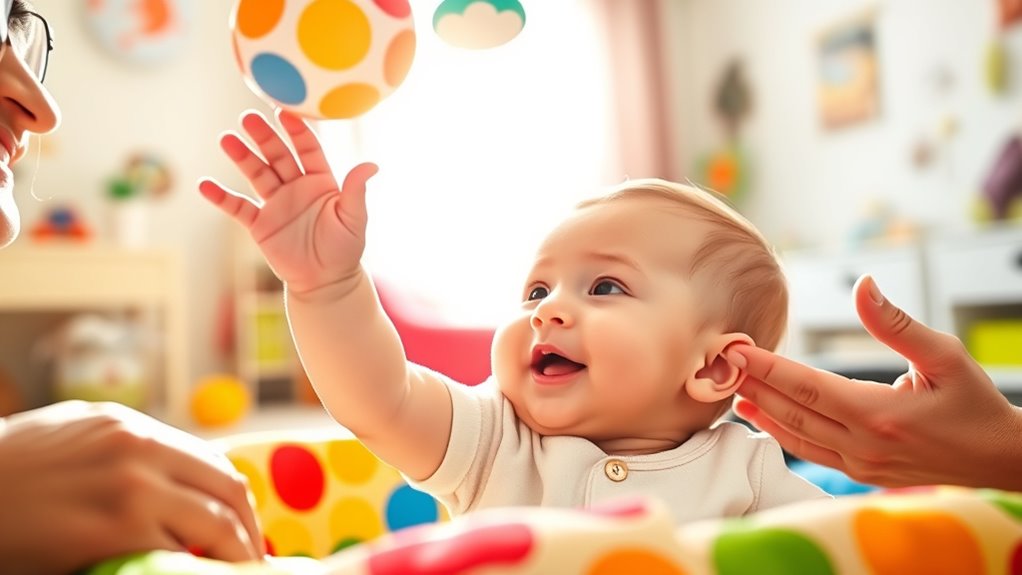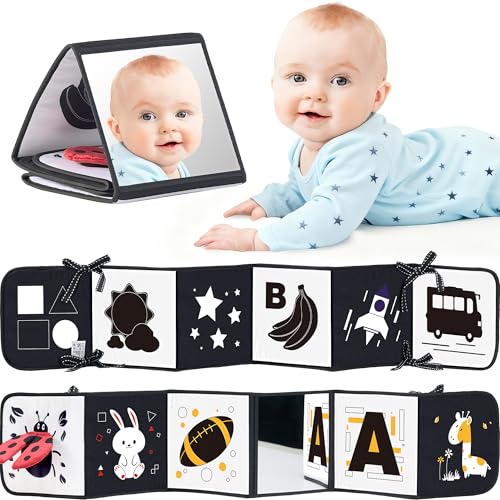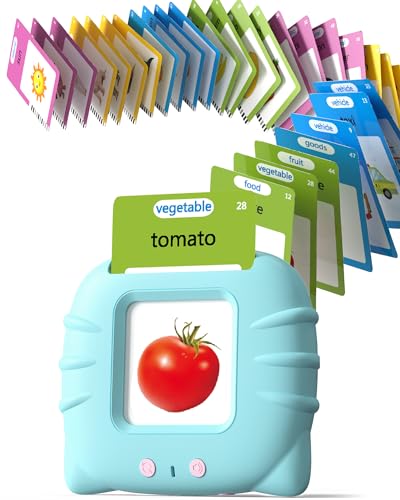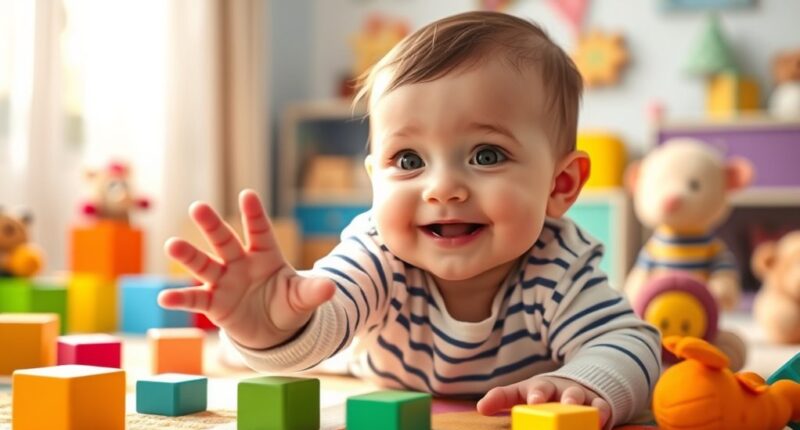Playtime substantially boosts your baby’s brain development by stimulating their senses, encouraging emotional bonds, and fostering early communication skills. When you talk, sing, and play together, you help build neural pathways for language and problem-solving. Exploring different textures and sounds sharpens cognitive growth, while cuddling and smiling strengthen emotional attachment. Engaging actively during play nurtures curiosity and resilience. Keep exploring these playful strategies to open even more ways your baby’s brain can thrive.
Key Takeaways
- Play stimulates neural connections through diverse sensory experiences, enhancing overall brain growth.
- Interactive play promotes language development by encouraging sound experimentation and communication.
- Engaging in problem-solving activities during play strengthens cognitive skills like object permanence.
- Bonding during play releases oxytocin, supporting emotional regulation and secure attachment.
- Active participation in play motivates curiosity, fostering resilience and confidence in learning new skills.

Playtime isn’t just fun for babies—it’s a powerful tool that sparks brain development in surprising ways. When you engage with your little one during play, you’re helping shape their ability to communicate and connect with others. During these moments, your baby begins to pick up on language cues, sounds, and expressions, laying the foundation for language development. As you talk, sing, or narrate what you’re doing, you’re providing essential linguistic input that helps your baby understand words and their meanings. Repeating simple phrases and responding to your baby’s vocalizations encourages them to experiment with sounds, which is a critical step in learning how to speak.
Engaging in play helps babies develop language, connect with others, and experiment with sounds—building a strong communication foundation.
Beyond language, playtime greatly boosts emotional bonding. When you interact closely—whether through smiling, cuddling, or gentle touches—you’re creating a secure attachment that fosters trust and emotional resilience. These shared experiences release oxytocin, the “bonding hormone,” which strengthens your connection and helps your baby feel safe and loved. This emotional bonding isn’t just comforting; it’s also crucial for healthy brain development. A secure attachment encourages your baby to explore their environment confidently, knowing they have your support and affection. Over time, this sense of safety helps your baby develop emotional regulation and social skills, essential for navigating relationships later in life.
Play also stimulates your baby’s brain in ways that promote cognitive growth. When you introduce new toys, textures, or sounds, you challenge your baby to learn and adapt. These interactions strengthen neural pathways, making it easier for your little one to process information and develop problem-solving skills. As you observe and respond to their curiosity, you’re helping them build confidence and resilience in learning. Additionally, engaging in activities like peek-a-boo or simple hide-and-seek not only entertain but also teach your baby about object permanence—the understanding that objects continue to exist even when out of sight—an important milestone in cognitive development. Engaging in varied sensory experiences during play further enhances neural connectivity and supports comprehensive brain growth.
Most importantly, your active participation signals to your baby that they’re valued and understood. This encouragement motivates them to explore, communicate, and develop a love for learning. Remember, every giggle, smile, and coo during playtime isn’t just a fleeting moment of joy; it’s a building block for your baby’s brain, fostering growth in language, emotional health, and cognition. So, make the most of these playful moments—they’re more impactful than you might realize, shaping your baby’s future in profound ways.

Black and White Baby Books for Newborn – Tummy Time Mirror & Sensory Toys Soft Montessori Toy for Infant Visual Stimulation, Brain Development & Early Learning – High Contrast Toys for 0-6 Months
Stimulate Your Baby’s Senses: This black and white baby book, designed for babies 0-6 months, features high-contrast black…
As an affiliate, we earn on qualifying purchases.
As an affiliate, we earn on qualifying purchases.
Frequently Asked Questions
How Does Playtime Influence a Baby’s Emotional Development?
Playtime greatly influences your baby’s emotional development by helping them learn emotional regulation and build secure attachment. When you engage in play, you provide a safe space for your baby to express feelings and develop trust. This interaction fosters emotional resilience and strengthens your bond. As they feel loved and understood, your baby gains confidence and learns to manage emotions, setting a foundation for healthy emotional growth.
What Types of Play Are Best for Cognitive Growth?
You should focus on sensory play and problem-solving activities for your baby’s cognitive growth. Sensory play, like exploring textures or listening to different sounds, helps stimulate their senses and build neural connections. Problem-solving activities, such as stacking blocks or completing simple puzzles, encourage critical thinking and reasoning skills. By engaging in these types of play, you’re actively supporting your baby’s brain development and laying a strong foundation for future learning.
Can Playtime Reduce Developmental Delays?
Playtime routines can markedly reduce developmental delays by encouraging consistent, engaging interactions. When you dedicate quality time to play, you strengthen parent-child bonding, which supports emotional and cognitive growth. Active play helps your baby develop essential skills and catch up on delayed milestones. By making play a regular part of your routine, you create a nurturing environment that promotes early development and boosts your baby’s confidence and curiosity.
How Does Play Affect a Baby’s Sleep Patterns?
Think of play as a gentle lullaby, guiding your baby into restful sleep. When you engage in play and language, it helps regulate their nervous system, creating a calming rhythm. Sensory exploration during play, like feeling textures or hearing sounds, soothes their mind. This balance improves sleep patterns, making bedtime smoother. Your active involvement helps your baby develop healthy sleep habits through joyful, calming interactions.
Are There Specific Toys That Stimulate Brain Development?
You should choose toys that encourage sensory exploration and help develop motor skills. Look for colorful, textured objects, soft blocks, and age-appropriate musical instruments, as they stimulate your baby’s senses and promote hand-eye coordination. Toys that require grasping, shaking, or stacking challenge their motor skills while engaging their mind. By selecting these toys, you’re fueling their brain development and making playtime both fun and educational.

Airbition Talking Flash Cards for Toddlers 1 2 3 4 Year Olds, Montessori Language Learning with 224 Words, Pocket Speech Therapy Tools, and Speech Development Educational Playthings for Children
Toddler Montessori Learning Device: This educational talking flash card features 224 colorful illustrations and sounds. It includes animals,…
As an affiliate, we earn on qualifying purchases.
As an affiliate, we earn on qualifying purchases.
Conclusion
Now you see how playtime nurtures your baby’s curiosity, sharpens their skills, and sparks creativity. As they explore, learn, and grow, you’re fueling their development, building their confidence, and shaping their future. Play isn’t just fun—it’s a crucial foundation for their brain, their abilities, and their happiness. So, keep playing, keep exploring, and watch your little one flourish in every moment of joy and discovery.

Melissa & Doug K’s Kids, Flip Fish Stuffed Animal, Soft Baby Book, Multi-Textured Squeaking & Crinkling Infant Sensory Toys for Babies with Baby Mirror, Tummy Time Toys for Infants Ages 0–9 Months
Engaging Sensory Play: This cuddly fish friend is a squeaking & crinkling, multi-textured baby toy, with hidden pictures…
As an affiliate, we earn on qualifying purchases.
As an affiliate, we earn on qualifying purchases.

GUND Baby Peeki The Puppy Animated Plush, Singing Stuffed Animal, Sensory Toy for Babies and Toddlers, Plays Peek-a-Boo and Sings, Brown/Cream, 12”
SINGING PUPPY: Peeki is a cute seated puppy that uses music and movement to stimulate baby’s senses and…
As an affiliate, we earn on qualifying purchases.
As an affiliate, we earn on qualifying purchases.









